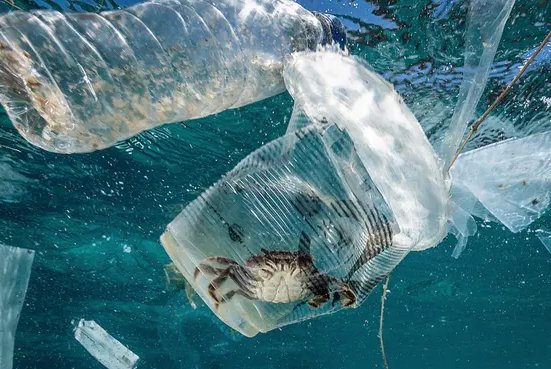
Date: 2024-08-16 Page is: DBtxt003.php txt00016518
Plastic Pollution
Huge Costs have been Ignored
Marine plastic pollution costs the world up to $2.5tn a year, researchers find ... Scientists warn that social and economic price of plastic waste to global society has been underestimated
The high cost of pollution in terms of environmental degradation per se and remediation is enormous. Who is responsible for this state of affairs? It is we the consumers who have embraced convenience without considering the true cost, and it is corporate producers and marketers who have laughed all the way to the bank. We need some innovative thinking to enable an equitable clawback from these two groups so that there is a multi-trillion fund to pay for the global cleanup that is vital. What would it take to raise $10 trillion to pay for the essential clean-up that the planet needs?
Peter Burgess
Seascape: the state of our oceans is supported by The David and Lucile Packard Foundation
Plastic pollution in the world’s oceans costs society billions of dollars every year in damaged and lost resources, research has found.
Fisheries, aquaculture, recreational activities and global wellbeing are all negatively affected by plastic pollution, with an estimated 1-5% decline in the benefit humans derive from oceans. The resulting cost in such benefits, known as marine ecosystem value, is up to $2.5tn (£1.9tn) a year, according to a study published this week in Marine Pollution Bulletin.
Plastic waste is also believed to cost up to $33,000 per ton in reduced environmental value, the study found. An estimated 8m tons of plastic pollution enter the world’s oceans every year.
Dr Nicola Beaumont, an environmental economist at Plymouth Marine Laboratory, who led the study, said the investigation was the first of its kind to explore the social and economic impact of plastics in the sea.
“Our calculations are a first stab at ‘putting a price on plastic’. We know we have to do more research to refine, but we are convinced that already they are an underestimate of the real costs to global human society,” said Beaumont.
The estimates do not take into account the direct and indirect impacts on the tourism, transport and fisheries industries, or on human health, the authors warned.
Plastic waste can be found all over the world – from the most populated coastlines to the most remote – and its impact on zooplankton, invertebrates, fish, turtles, birds and mammals is all negative, the study found. But authors discovered that plastics – which can remain buoyant for decades or longer, travelling distances of more than 3,000km from origin – create new habitats for bacteria and algae. These “colonies” increase the biogeographical range of bacteria and algae, thereby risking the spread of invasive species and disease, the research found.
A crab stuck in plastic in Verde Island Passage, Batangas City, Philippines. Photograph: Noel Guevara/Greenpeace/EPA
 A crab stuck in plastic in Verde Island Passage, Batangas City, PhilippinesFacebook Twitter Pinterest
Dr Kayleigh Wyles, an environmental psychology lecturer at the University of Surrey, said the research was the first to show the “holistic” impact of plastic pollution.
A crab stuck in plastic in Verde Island Passage, Batangas City, PhilippinesFacebook Twitter Pinterest
Dr Kayleigh Wyles, an environmental psychology lecturer at the University of Surrey, said the research was the first to show the “holistic” impact of plastic pollution.
“As well as the devastating effect plastics have on our ecological and marine systems, they also directly and indirectly impact society,” she said.
Huge rise in US plastic waste shipments to poor countries following China ban “Quantifying the enormous tangible and intangible costs associated with marine plastic waste can only help to make the case for devoting our attention and resources now to protecting the seas for future generations to enjoy.”
Beaumont said she too hoped the study would streamline services to address plastic pollution and “help us make informed decisions”.
“Recycling a ton of plastic costs us hundreds against the costs of thousands if we let it into the marine environment,” she said.
“We now trade carbon to reduce emissions to the atmosphere, so we should be able to do something similar with plastics. We hope this study will highlight the reality of the plastic problem in human terms.”
-----------------------------------------------------------------------------------
Shares 5,963 11:56 Plastic in paradise: the battle for the Galápagos Islands' future – video
Plastic in paradise: the battle for the Galápagos Islands' future 46,928 views
The Guardian Published on Apr 3, 2019
The Galápagos Islands are supposedly one of the most pristine locations on the planet, but plastic pollution arriving by sea is threatening this unique habitat and wildlife. Leah Green travels to the islands to see how our reliance on plastic is affecting even the most remote of locations, and to see how the archipelago is hoping to lead the worldwide fight against plastic Subscribe to The Guardian on YouTube ► http://is.gd/subscribeguardian
Support the Guardian ► https://support.theguardian.com/contr... Today in Focus podcast ► https://www.theguardian.com/news/seri... Sign up for the Guardian documentaries newsletter ► https://www.theguardian.com/info/2016... The Guardian ► https://www.theguardian.com
The Guardian YouTube network: Guardian News ► http://is.gd/guardianwires Owen Jones talks ► http://bit.ly/subsowenjones Guardian Football ► http://is.gd/guardianfootball Guardian Sport ► http://bit.ly/GDNsport Guardian Culture ► http://is.gd/guardianculture Category News & Politics